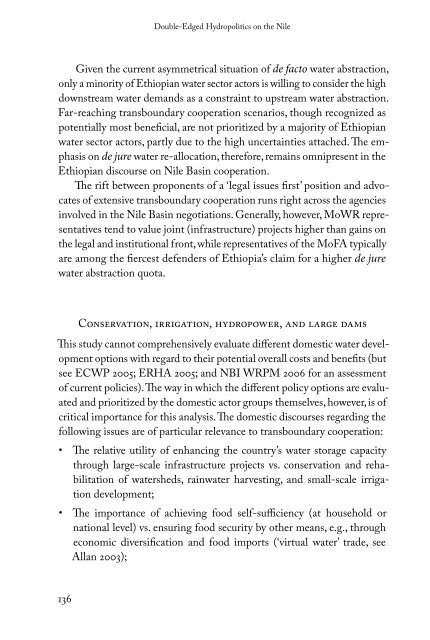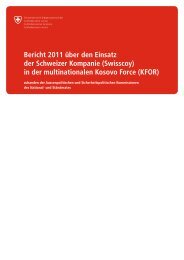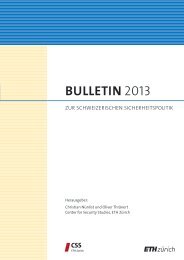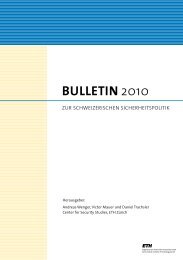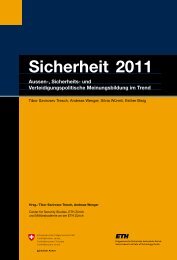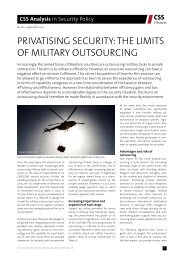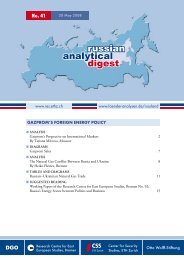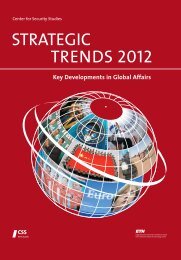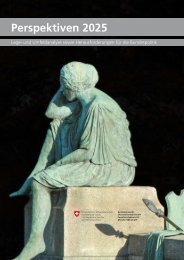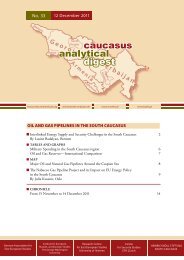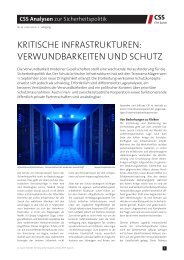Double-Edged Hydropolitics on the Nile - Center for Security Studies ...
Double-Edged Hydropolitics on the Nile - Center for Security Studies ...
Double-Edged Hydropolitics on the Nile - Center for Security Studies ...
Create successful ePaper yourself
Turn your PDF publications into a flip-book with our unique Google optimized e-Paper software.
<str<strong>on</strong>g>Double</str<strong>on</strong>g>-<str<strong>on</strong>g>Edged</str<strong>on</strong>g> <str<strong>on</strong>g>Hydropolitics</str<strong>on</strong>g> <strong>on</strong> <strong>the</strong> <strong>Nile</strong><br />
Given <strong>the</strong> current asymmetrical situati<strong>on</strong> of de facto water abstracti<strong>on</strong>,<br />
<strong>on</strong>ly a minority of Ethiopian water sector actors is willing to c<strong>on</strong>sider <strong>the</strong> high<br />
downstream water demands as a c<strong>on</strong>straint to upstream water abstracti<strong>on</strong>.<br />
Far-reaching transboundary cooperati<strong>on</strong> scenarios, though recognized as<br />
potentially most beneficial, are not prioritized by a majority of Ethiopian<br />
water sector actors, partly due to <strong>the</strong> high uncertainties attached. The emphasis<br />
<strong>on</strong> de jure water re-allocati<strong>on</strong>, <strong>the</strong>re<strong>for</strong>e, remains omnipresent in <strong>the</strong><br />
Ethiopian discourse <strong>on</strong> <strong>Nile</strong> Basin cooperati<strong>on</strong>.<br />
The rift between prop<strong>on</strong>ents of a ‘legal issues first’ positi<strong>on</strong> and advocates<br />
of extensive transboundary cooperati<strong>on</strong> runs right across <strong>the</strong> agencies<br />
involved in <strong>the</strong> <strong>Nile</strong> Basin negotiati<strong>on</strong>s. Generally, however, MoWR representatives<br />
tend to value joint (infrastructure) projects higher than gains <strong>on</strong><br />
<strong>the</strong> legal and instituti<strong>on</strong>al fr<strong>on</strong>t, while representatives of <strong>the</strong> MoFA typically<br />
are am<strong>on</strong>g <strong>the</strong> fiercest defenders of Ethiopia’s claim <strong>for</strong> a higher de jure<br />
water abstracti<strong>on</strong> quota.<br />
C<strong>on</strong>servati<strong>on</strong>, irrigati<strong>on</strong>, hydropower, and large dams<br />
This study cannot comprehensively evaluate different domestic water development<br />
opti<strong>on</strong>s with regard to <strong>the</strong>ir potential overall costs and benefits (but<br />
see ECWP 2005; ERHA 2005; and NBI WRPM 2006 <strong>for</strong> an assessment<br />
of current policies). The way in which <strong>the</strong> different policy opti<strong>on</strong>s are evaluated<br />
and prioritized by <strong>the</strong> domestic actor groups <strong>the</strong>mselves, however, is of<br />
critical importance <strong>for</strong> this analysis. The domestic discourses regarding <strong>the</strong><br />
following issues are of particular relevance to transboundary cooperati<strong>on</strong>:<br />
• The relative utility of enhancing <strong>the</strong> country’s water storage capacity<br />
through large-scale infrastructure projects vs. c<strong>on</strong>servati<strong>on</strong> and rehabilitati<strong>on</strong><br />
of watersheds, rainwater harvesting, and small-scale irrigati<strong>on</strong><br />
development;<br />
• The importance of achieving food self-sufficiency (at household or<br />
nati<strong>on</strong>al level) vs. ensuring food security by o<strong>the</strong>r means, e.g., through<br />
ec<strong>on</strong>omic diversificati<strong>on</strong> and food imports (‘virtual water’ trade, see<br />
Allan 2003);<br />
136


